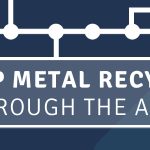SCRAPPING WHITE GOODS DOES GOOD
It’s a shocking fact that currently in the UK, only a third of electrical items are recycled. This is despite them having large amounts of useful metals that could be repurposed for use in new products. Household appliances aren’t safe to dispose of with regular household waste. Therefore, to avoid over using landfill space and damaging the surrounding environment, the best option is to take them to your local scrap dealer to recycle them in a safe and planet-friendly way. Scrapping your white goods can do good – for both the environment and your pocket!
It doesn’t matter whether you’re upgrading your household electrical items or they’re faulty and damaged beyond their original use. There is money to be made by weighing in their components for scrap if they’re no longer needed. You just need to know what you’re looking for!
Nothing needs to be overlooked when it comes to scrapping white goods. Even the power cords in large and small appliances can contain copper elements! Those small looking nuts and bolts holding the appliances together can also add up if they’re weighed in all at once. Want to know more? We’ve made a list of the most common house hold appliances to be thrown out with a list of metals that can be found within each. Find out just what people are missing out on by not scrapping them instead.
LARGE WHITE GOODS
Almost all white goods have a life span of around 10 – 20 years and many of them are typically made of up to 75% metal. One of the biggest impacts of correctly recycling white goods is saving this metal from going into landfill. You are instead returning it to the manufacturing cycle. This in turn protects the earth’s natural resources and takes the strain off mining for new materials.
Washing machines and tumble dryers can have a few different types of metal components inside of them. Insulated copper wires are used to provide them with power. Electric motors drive the belts that make the drums spin and steel or aluminium are used to make the body framework.
Dishwashers also have a similar construction. Their bodies are made up of stainless steel which resists hard water and preserves heat to dry the dishes more quickly.
Top tip: make sure to unplug your dishwasher a few days before transporting it to allow it to properly cool down before being scrapped.
Ovens and cookers have an average life span of 13-15 years. Electric ovens typically wear out more quickly than gas powdered ones and both come in a wide variety of shapes and sizes. They can be constructed of up to 89% metal so are great for weighing in at scrap yards.
The hobs of electric ovens are usually made from ceramic glass. Their frames are most commonly made from steel, stainless steel or aluminium, as are gas ovens. There is usually some copper to be found in the wiring of these appliances too.
Extraction hoods sit over the cooker to remove excess heat and steam from the room. They can be made of a variety of metals ranging from steel, stainless steel or even pure copper. Weigh these in at the same time as your old appliance for an even bigger pay out!
SMALLER HOUSEHOLD ITEMS
Microwaves, kettles and toasters frequently contain copper in their wiring. Copper does a very good job of conducting electricity. This makes it a perfect choice of metal for use in cabling to carry the electrical currents to the devices that need them. Aluminium is becoming increasingly popular for use in cables as it is also a good conductor of electricity and has a cheaper cost price than copper. The bodies of these appliances are mainly made from steel.
Some appliances can be made of metal alloys which are a mixture of 2 or more metals. If you are unsure, visit our guide to identifying which type of metal you have. Unfortunately, we are unable to collect scrap meaning any items that you wish to bring to us must be delivered. We offer services to Leigh, Atherton, Wigan, Tyldesley, Bolton, Worsley, Manchester and Salford. We have a well-maintained and clean unloading area which ensures vehicle safety when visiting our site. To arrange delivery just call our friendly office on 01942 88 33 22, fill out our contact form, or drop us an email on info@kasmetal.com. We’ll be happy to help.




